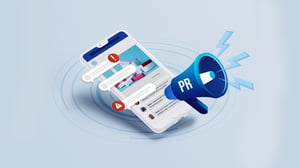
Why Comments Matter to PR Teams
Bonus: Get a free analysis of your comments to better understand your risks and opportunities
Social media and public relations managers are two very distinct roles and worlds. However, in this rapidly changing digital world, they collide with each other more often than ever as both have the same goals: managing reputation and building brand awareness.
Sometimes social and PR unite efforts to promote an outstanding company achievement. Other times, a crisis arises on social media and escalates to the press. Also, very often, a story (positive or negative) is brought to the news, and people decide to discuss it right on your brand’s social media accounts.
These days, it’s common for brands to be the topic of discussion on social media, either because of a tone-deaf ad, a controversial tweet, or an insensitive political or cultural stance. Social media can quickly escalate from negative media coverage to a full-on PR crisis that will cause immediate and long-term damage to your brand reputation.
Discover why PR teams need to start paying attention to social media comments:
- To avoid a PR Crisis
- To anticipate potential crises (and getting ahead of the situation before it escalates)
- To measure the impact of a PR crisis
- To inspire new PR stories
1. Comments can help prevent a PR Crisis
A social media crisis that escalates to a PR crisis can harm a brand's reputation. It’s better if you can prevent a crisis before it starts; extra eyes on the comments section can help you do exactly that.
...By Ensuring 24/7 Monitoring
Media monitoring is only effective if you’re doing it at a 360º level, which includes social media conversations. Many PR crises can be avoided by simply paying attention to what people say on your posts and ads.
...By Implementing Effective Real-Time Alerts
Setting up efficient real-time alerts on social media is essential to avoid a PR crisis. Typos, broken links, and other post issues’ alerts can be critical for social media success. Furthermore, a spike in negative sentiment on your posts can suggest that your brand is on the verge of an upcoming crisis.
Ensure you’re constantly alerted about these urgent issues, so both PR and social media teams can take quick action. Pausing an ad that is sparking negativity, for example, might be vital to preventing your brand from a PR crisis.
...By Moderating Harmful Comments
If you’re not moderating harmful comments - such as hate speech, spam, violence, brand attacks, bullying - and many other damaging remarks, you’re risking a PR Crisis.
48% of people say it’s a brand’s fault if its ads appear next to hate speech, violent, or sexually inappropriate comments.
Social Media Moderation is essential to make sure brands are not associated with, for example, hate speech or discriminatory speech. Racist comments that target individuals on your brand's social pages create a dangerous space for unproductive conversations and attacks. By acting as a bystander, your brand could be putting its community and reputation in danger. You should have community guidelines in place to make sure your brand is protected.
|
Case Study: How discriminatory comments on a social media ad turned into a PR Crisis 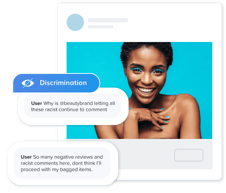
A beauty brand had brand suitability concerns after launching a new product and garnering 30,000 social media comments, most of which were discriminatory towards the model. The ad was a dark post, and the company only became aware of the situation after the media picked up on it. The brand signed up for BrandBastion's Moderation + Alerts solution to take a proactive approach to remove harmful comments, protecting their community and brand. |
2. Comments help anticipate potential crises (and get ahead of the situation before it escalates)
Sometimes, a crisis is inevitable, and the best way to deal with it is to be prepared. Effective crisis management starts before any issue escalates, and we get the opportunity to tell “the brand’s side of the story” before it spirals out of control.
Listening to your audience online will help you uncover and address a potential crisis. The best way to anticipate a crisis is by being aware of brand attacks and customer complaints on social media. Here are a few examples on how comments can forecast a crisis:
Example 1: Multiple people experienced racism in your brand’s stores and are calling the brand out on social media
These types of comments can easily escalate to crises. As a PR Team, you know the best way to deal with this is to get ahead of the situation before the media picks up on it.
Make sure you admit there’s a problem if that’s the case and share the brand’s solution, goals, and measures to stop bias and racism in stores.
Example 2: Multiple people had a severe allergic reaction to your product
Whether it was food poisoning from your cereal brand, a rash from your makeup, or a defective product, these types of comments can be newsworthy for the media. For most situations, the right call will be to get ahead of the problem, acknowledge the flaw with a public statement, and, if necessary, recall the product.
|
Case Study: How a beauty brand got ahead of a potential PR Crisis 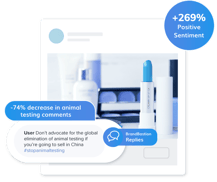
In the beauty industry, many large and highly engaged brands face customer inquiries and public scrutiny centered around sensitive topics on social media, which can escalate into a PR crisis if not attended to. A global makeup brand does not test on animals, yet they were receiving controversial comments that said otherwise. The brand decided to take urgent action using BrandBastion’s solutions. We tracked and monitored all comments related to animal testing, and BrandBastion responded on the brand’s behalf to customers. BrandBastion was able to prevent false claims and brand attacks from escalating. |
3. Comments help measure the impact of a PR crisis
Sometimes crises cannot be avoided or controlled. So if you already put your crisis communications plan into action and everything went according to plan, how do you know how well your brand is doing under fire?
Looking at the press clipping volume is one way to measure your crisis communication plan's effectiveness, but it is not sufficient. Social media listening will provide you 100% transparent feedback on the impact of the crisis and your brand’s subsequent actions.
Paying attention to comments and doing a qualitative analysis will be paramount to understanding how well your brand did at getting your key message heard and believed. Sentiment analyses help you understand how your audience is feeling. Additionally, you should do a keyword review and dive into people’s comments individually.
Let’s consider a hypothetical example. An e-comm apparel brand started a new campaign to promote their jeans, and they were receiving a lot of comments accusing the brand of a lack of diversity in their ads. The social community said that they were only showing “skinny” and “white” models. All of a sudden, the media picked up the story. The PR team needs to understand how the audience is feeling before spreading their key messages. Afterward, they need to understand how the audience is feeling to evaluate the efficiency of their crisis communication plan. The social media and PR teams needed to work together to prevent additional damage to brand reputation.
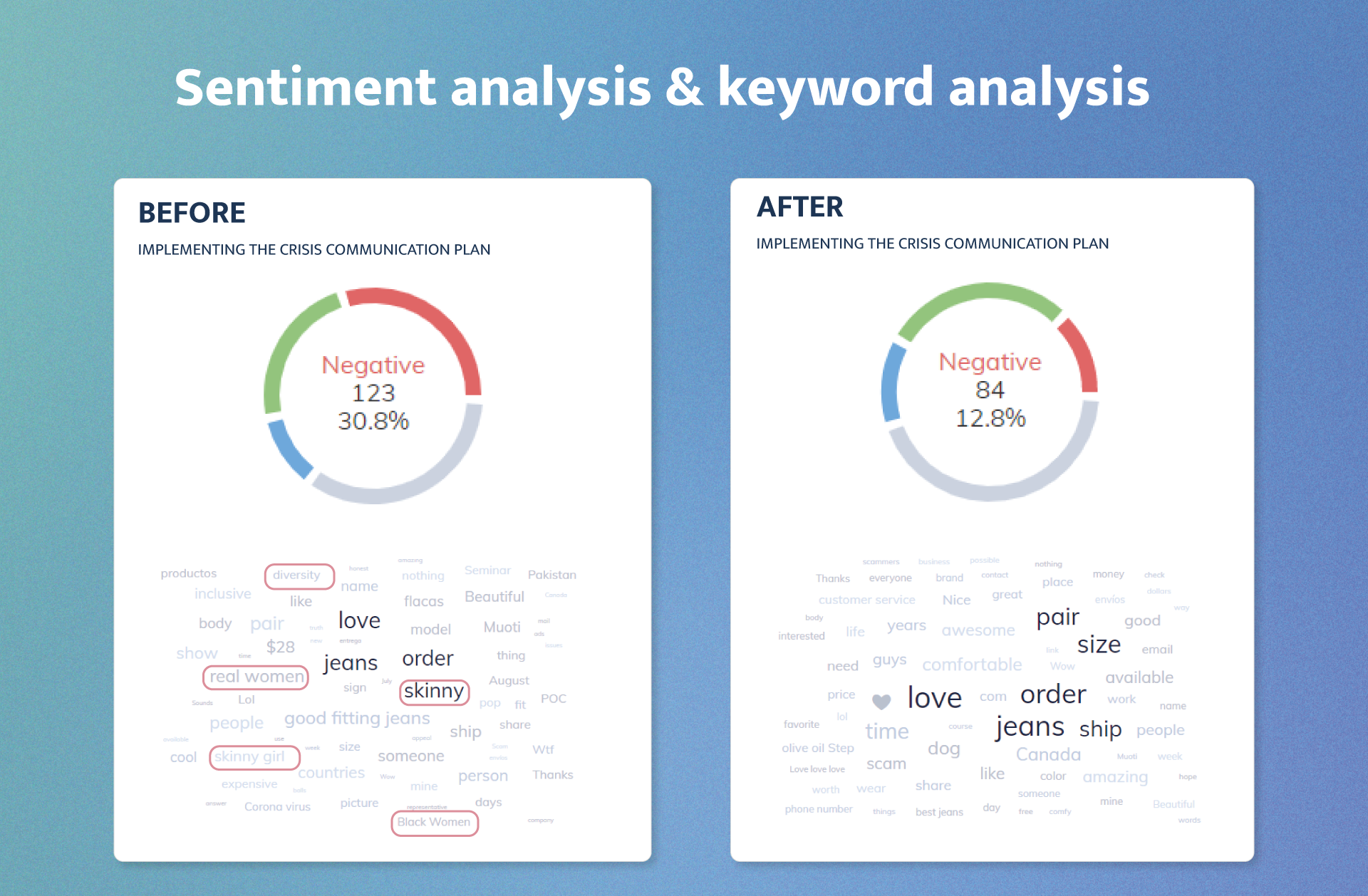 Before implementing the crisis communication plan, the brand understands the problem: there are many mentions of “skinny” or “real women” mentioned across social media comments. The social team decided to change the creative to make it more inclusive and diverse. The PR team implemented a key messaging to highlight the inclusivity and diversity efforts of the brand. Through social media listening, both teams can analyze the impact of the crisis and the success of their plan of action.
Before implementing the crisis communication plan, the brand understands the problem: there are many mentions of “skinny” or “real women” mentioned across social media comments. The social team decided to change the creative to make it more inclusive and diverse. The PR team implemented a key messaging to highlight the inclusivity and diversity efforts of the brand. Through social media listening, both teams can analyze the impact of the crisis and the success of their plan of action.
Be sure to use social media listening when the crisis is active to keep track of any changes. Once the crisis starts to disappear, it will be essential to use this data to guide your next PR strategy. For example, your brand may want to understand if you need to improve public perception or continue with business-as-usual.
4. Comments help inspire new PR stories
Sharing consumers’ positive stories about a brand can be a highly efficient marketing strategy, but it can also be a powerful PR approach.
Storytelling is essential for PR efforts, and if you want to engage the media and your audience, it’s vital to find a good story and tell it well. Real people’s experiences are always stronger and social media conversations can be a good starting point to find these stories.
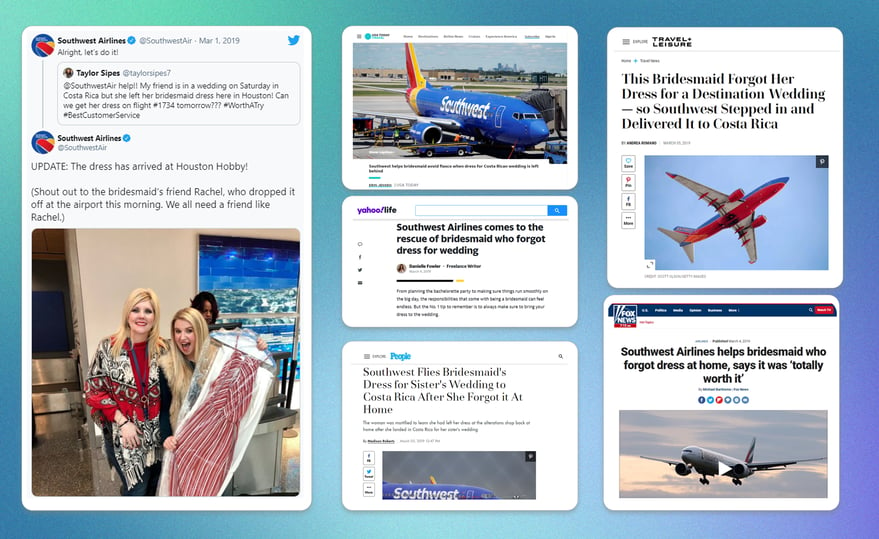
Southwest Airlines is an expert in using social media conversations to inspire new stories. One of their passengers forgot her bridesmaid dress after flying to Costa Rica for a destination wedding. Her friend Taylor reached out to Southwest Airlines on Twitter after seeing they had a flight to Costa Rica the next morning. Southwest made it possible, keeping everyone updated every step of the way. Of course, this story was also picked up by the media, improving public perception and proving once again that real and relatable stories resonate better with the audience and the media.
The “no comment” approach is outdated. On social media, everything moves, changes, and escalates fast. PR and social teams cannot work in silos in a 24/7 media world.
In 2021, it’s imperative that you read comments, gain insights from them, and engage with them. Monitoring social media comments is the next essential element to your PR strategy.
No credit card required.